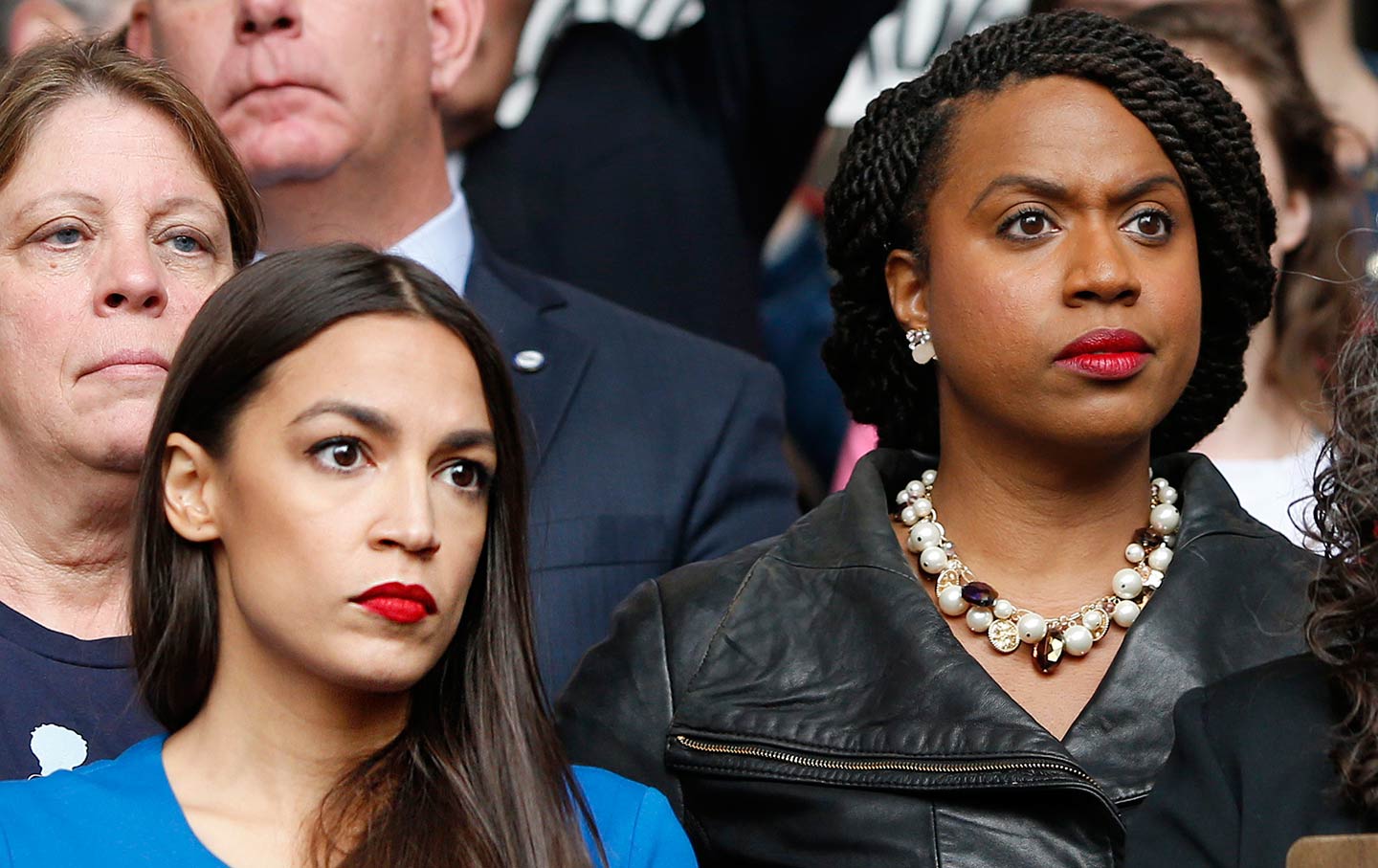
Alexandria Ocasio-Cortez and Ayanna Pressley, who were both just elected to Congress from, respectively, New York’s 14th Congressional District and Massachusetts’s Seventh Congressional District, at a rally in October.(AP Photo / Mary Schwalm)
With the results of the November midterm elections, we have officially witnessed the end of Rubinomics. Former Treasury secretary Bob Rubin was the ringleader of an incremental, neoliberal economics ascendant in the Democratic Party in the 1990s and through the Obama years. The Rubin school oversaw the deregulation of banking and finance, free-trade agreements with insufficient worker and environmental protections, and the dismantling of core parts of the safety net with Bill Clinton’s “welfare reform” of 1996. These economists, taking a page from Ronald Reagan, argued that markets self-regulate if we just leave them alone.
History has proven them wrong, and this month’s elections signaled the start of a fresh approach. A decade out from the Great Recession, wages are still stagnant, and the cost of living is spiraling out of control. Even though typical economic indicators, like the low unemployment rate, suggest we live in a strong economy, exit polls show that only a third of voters say their own financial situation has improved in the past two years.
A new cohort of candidates this year chose to run on a clear, unapologetic economic progressivism as good politics and good policy. A new analysis found that two-thirds of the incoming Democratic freshman class in Congress campaigned on some form of Medicare for All or the expansion of Social Security. Nearly 80 percent campaigned on tax credits that benefit working families or on rolling back Trump’s tax cuts for the wealthy.
The election showed that the percolating economic progressivism of newly elected Representatives Alexandria Ocasio-Cortez and Ayanna Pressley was not just a flash in the pan—it’s a politics that works at the ballot.
Take Lauren Underwood, a progressive woman of color just elected to Congress from a suburban Illinois toss-up district. She ran against the Trump tax cuts, calling for reform of a tax system that “overburdens middle-class families with paying more than their fair share of taxes.” Katie Hill, in the formerly Republican-dominated Southern California suburbs, and Cindy Axne in Iowa also ran successful populist campaigns.
Similarly, voters in clearly red states showed their support for progressive economics in direct elections for ballot measures. In Missouri and Arkansas, voters increased the state minimum wage. In Utah, Idaho, and Nebraska, voters approved ballot measures to expand Medicaid, blowing past the intransigence of Republicans and conservative Democrats.
Not every candidate running on a progressive agenda won, and there is much to be learned from races where we came up short. But most newly elected House Democrats won on progressive economic ideas. To be clear, this is not about a rivalry between the Bernie Sanders and Hillary Clinton wings of the party. In fact, most of these candidates shunned direct connections with Sanders, Clinton, Elizabeth Warren, and other national politicians. Instead, they moved to where voters are today in 2018, and voters rewarded them.
As we hurtle toward the crowded 2020 field of candidates vying for the Democratic nomination, when it comes to economics, the premium will be on boldness and originality. We are already seeing potential candidates set themselves apart by injecting new ideas into the debate: Senator Warren’s proposal to have worker representatives on large corporate boards, Senator Kirsten Gillibrand’s proposal for a postal bank, Sanders’s vision of a job guarantee, and Cory Booker’s proposal for a new baby bond program.
Some of the most ambitious ideas are on tax policy. The race to repeal and replace President Trump’s tax bill has begun, and Senator Kamala Harris has proposed a monthly cash payment of up to $500 that would complement existing tax credits for working families earning up to $100,000. Another 2020 contender, Ohio Senator Sherrod Brown, won re-election handily after introducing a substantially broadened Earned Income Tax Credit reaching well into the middle class. Both policies share many elements of the Working Families Tax Credit that the organization I co-chair, Economic Security Project, has proposed.
These are ambitious proposals, on the scale of President Trump’s tax cuts in terms of their cost but incomparable in terms of benefit. They build upon the boldness that worked well for candidates in this midterm election, and add an even deeper level of detail and thoughtfulness to build broader support. That is a winning formula for Democrats in 2020, and thankfully, would signal a definitive end to the era of Rubinomics.
Chris HughesChris Hughes is co-chair of the Economic Security Project, a nonprofit initiative to end poverty and rebuild the middle class by expanding cash transfer systems in the United States. He is the author of Fair Shot: Rethinking Inequality and How We Earn.